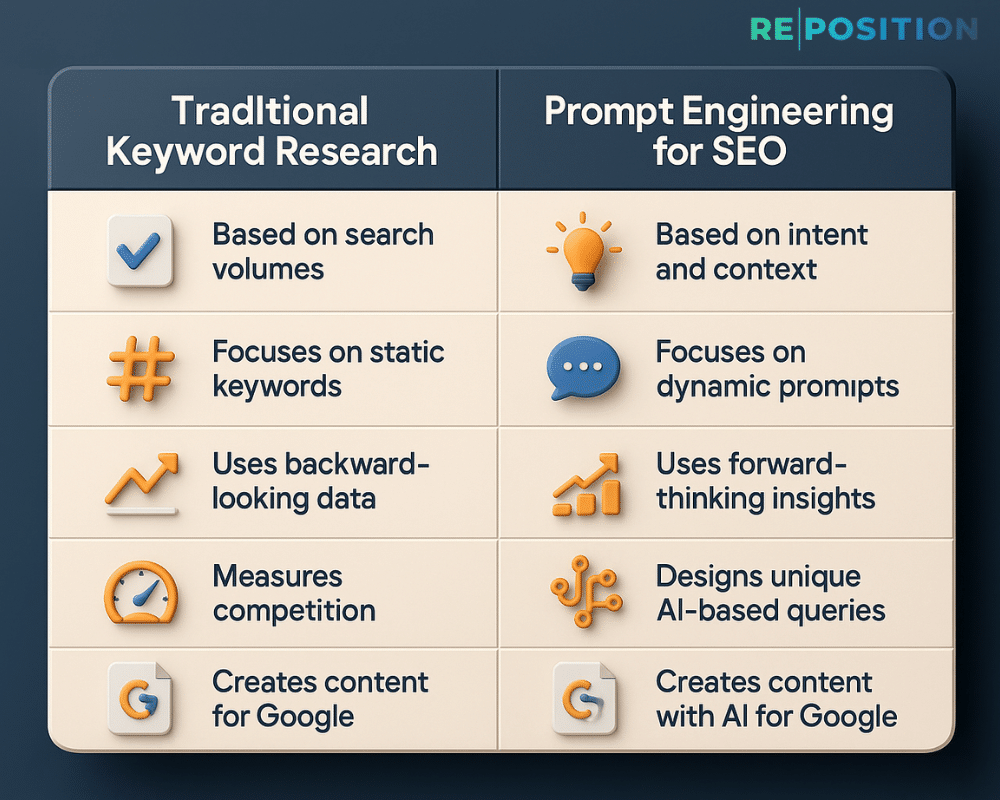The world of SEO has always been about understanding how people search. But in 2025, the rules have changed, we’re not just optimizing for humans anymore. We’re learning to talk to machines that interpret, rewrite, and predict our queries before we even hit “search.”
Welcome to the age of Prompt Engineering for SEO, where writing the right instruction for an AI model has quietly become the new keyword research. This isn’t the kind of SEO we grew up with. It’s something deeper, more dynamic, a blend of AI in SEO, language precision, and strategic creativity.
At its core, prompt engineering for SEO is about crafting structured, context-aware inputs for AI models to generate meaningful, optimized content. It’s not just about “telling ChatGPT what to do.” It’s about understanding how it thinks.
Traditional keyword research was reactive, identifying what users searched in the past. But prompt engineering is proactive. It helps us create content around emerging trends, latent intents, and semantic opportunities that haven’t even shown up in keyword tools yet.
By learning how to speak AI’s language, marketers can turn AI content prompts into insights that power smarter strategies, faster ideation, and deeper audience alignment.
Let’s face it, old-school keyword research is losing steam. Search engines no longer rely on rigid keyword matching. Instead, they focus on user intent, contextual relevance, and content semantics, all of which are AI-driven.
Prompt engineering, in this sense, becomes the new bridge between what AI understands and what users mean.

This shift means that SEO professionals must now think like AI trainers, not just data analysts.
The rise of AI in SEO is reshaping the entire digital landscape. Search engines are getting smarter, predictive, and conversational. And with tools like ChatGPT, Gemini, and Claude, the internet is being rewritten in real time.
Prompt engineering allows you to:
By learning how to guide AI effectively, you gain a competitive edge in every content niche imaginable.
AI in SEO isn’t just a buzzword, it’s the silent backbone of every ranking algorithm. Google’s use of RankBrain, BERT, and now Gemini, proves that understanding meaning trumps counting keywords.
With prompt engineering, we’re no longer optimizing for AI, we’re optimizing with AI. This partnership allows marketers to craft precision-tuned content that anticipates both user intent and algorithmic logic.
Think of it this way:
If traditional SEO is about finding the right words, SEO prompt engineering is about asking the right questions.
A well-engineered prompt does more than request information, it provides context, intent, and direction.
Here’s a formula that works:
For instance, instead of typing “AI in SEO,” try prompting:
This kind of AI content prompt not only produces richer results but also teaches the model what truly matters for search optimization.
Every prompt you write shapes the type of content AI generates. When designed strategically, prompts help ensure that your articles are:
By turning keyword research into a dialogue with AI, brands can consistently produce high-quality, intent-matched content that stands out in the SERPs.
SEO prompt engineering is about teaching AI how to think like an SEO strategist. Every line of instruction, every clarifying detail, helps shape how the model interprets and generates optimized text.
When done right, this process transforms your content pipeline:
This isn’t automation replacing humans; it’s augmentation. AI handles the data, and humans add the storytelling.
It’s tempting to think AI can do it all. But even the most advanced models need human guidance. AI can simulate expertise, but it can’t feel experience.
That’s where human SEO professionals come in, refining, verifying, and personalizing AI output. By combining AI’s precision with human intuition, we create content that is both technically optimized and emotionally engaging.
Think of prompt engineering as teaching a student, you guide, correct, and refine until they truly understand.
Here’s a practical workflow:
By integrating AI content prompts into your process, you ensure that every piece of content is strategically aligned with both human intent and machine logic.
The best part? Prompt engineering doesn’t replace keyword research, it elevates it.
Remember: The goal isn’t to trick the algorithm, it’s to teach the AI to produce content that naturally ranks.
As AI systems become more integrated with search engines, prompt engineering for SEO will become a foundational skill. The next evolution of search won’t just rank web pages, it will rank conversations, AI responses, and interactive experiences.
Tomorrow’s SEO specialists won’t just research keywords; they’ll craft prompts that train algorithms to understand intent. The line between content creation and AI communication will disappear, replaced by strategic, conversational optimization.
Prompt Engineering for SEO isn’t just a trend, it’s the natural evolution of search optimization. The future of SEO belongs to those who can guide machines to understand human intent with precision and empathy.
By mastering SEO prompt engineering and leveraging AI content prompts, marketers will not only dominate rankings but also define the voice of the next digital era.
In short: We’re no longer guessing what people type, we’re teaching machines how to think like the people who do.
What is prompt engineering for SEO?
It’s the art of crafting precise AI prompts that generate SEO-optimized, high-quality content aligned with search intent.
How is prompt engineering different from keyword research?
Keyword research looks backward using search data; prompt engineering looks forward by teaching AI to interpret and generate intent-rich content.
Can prompt engineering improve rankings?
Yes. It helps create content that aligns with both human and AI understanding, improving relevance, structure, and discoverability.
What tools help with SEO prompt engineering?
ChatGPT, Jasper, Frase, SurferSEO, and Clearscope all assist in refining prompts and optimizing AI-generated content.
Is AI content penalized by Google?
No, as long as it demonstrates experience, expertise, authority, and trust, and provides genuine value.
Will prompt engineering replace SEO experts?
Not at all. It will empower them to work faster, think deeper, and create content that connects across both human and AI audiences.